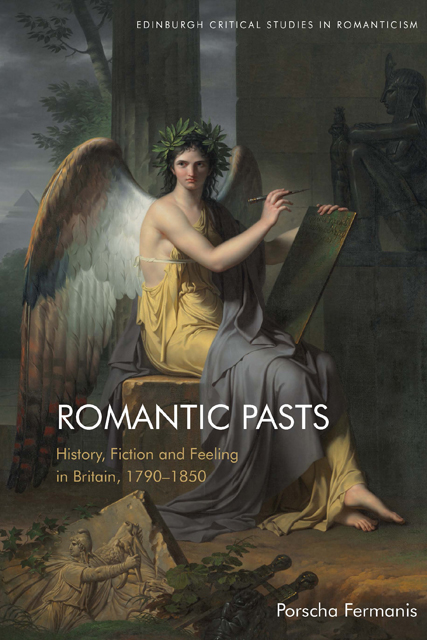Book contents
- Frontmatter
- Contents
- Acknowledgements
- Abbreviations
- Miscellaneous Frontmatter
- Introduction: Romantic Histories of Feeling
- 1 Historical Sentiment and Experience: Burke and Wollstonecraft
- 2 Historical Subjects and Ethical Character: Godwin and Carlyle
- 3 Historical Ethnogenesis and National Feeling:Scott, Moore, and Southey
- 4 Historical Style and the Man of Letters: Macaulay and Carlyle
- 5 Historical Reviewing: Specialisation and Periodical Culture
- Epilogue: A Romantic Return?
- Notes
- Bibliography
- Index
2 - Historical Subjects and Ethical Character: Godwin and Carlyle
Published online by Cambridge University Press: 18 November 2022
- Frontmatter
- Contents
- Acknowledgements
- Abbreviations
- Miscellaneous Frontmatter
- Introduction: Romantic Histories of Feeling
- 1 Historical Sentiment and Experience: Burke and Wollstonecraft
- 2 Historical Subjects and Ethical Character: Godwin and Carlyle
- 3 Historical Ethnogenesis and National Feeling:Scott, Moore, and Southey
- 4 Historical Style and the Man of Letters: Macaulay and Carlyle
- 5 Historical Reviewing: Specialisation and Periodical Culture
- Epilogue: A Romantic Return?
- Notes
- Bibliography
- Index
Summary
If the French Revolution was widely understood as an unfixed event belonging to the recent past and open to multiple reconfigurations, the English Revolution and Civil Wars occupied a more fully determined place in the historiography of the late eighteenth and early nineteenth centuries. When Godwin began writing his History of the Commonwealth in January 1822, interpretations of the seventeenth-century English Republic were still dominated by Hume's eight-volume History of England, which was famously dismissive of religious enthusiasm and sceptical of the role of parliamentary liberty in the history of the English constitution. Hume's counter-republican argument had already been ably rebutted by a series of radical and Whig rejoinders, from Catharine Macaulay's History of England to George Brodie's History of the British Empire (1822), but the history of the English Revolution remained an important means of party self-definition, not least because, as the Whig constitutional historian Henry Hallam pointed out, the seventeenth century was ‘the period from which the factions of modern times trace their divergence’.
Godwin himself had long rejected party histories of the English Commonwealth, arguing in ‘Of History and Romance’ that the ongoing differences between Whig and Tory historians paralleled earlier discrepancies between the eyewitness accounts of the republican Whitelocke and the royalist Clarendon. His subsequent distinction between the ‘superficial’ and the ‘profound’ historian condemns the former for choosing the historical perspective on the English Civil Wars that best suits his or her own prejudices, while crediting the latter with a sceptical awareness of the discontinuous and multiple possibilities of the past. Correctly identifying that party prejudice had increasingly coalesced around assessments of Oliver Cromwell's life and character, Godwin saw his History of the Commonwealth as an evidence-based intervention into the ‘accumulated slander and misconception’ that characterised the existing historiography on Cromwell and the seventeenth-century republicans more generally. Moving away from Whig constitutionalism and adopting a broadly republican approach, Godwin's Cromwell is the complex and daring progenitor of ‘a great and perilous [social] experiment’ rather than a power-hungry usurper of English constitutional liberty or a one-dimensional hero of parliamentary democracy.
- Type
- Chapter
- Information
- Romantic PastsHistory, Fiction and Feeling in Britain, 1790-1850, pp. 58 - 85Publisher: Edinburgh University PressPrint publication year: 2022

